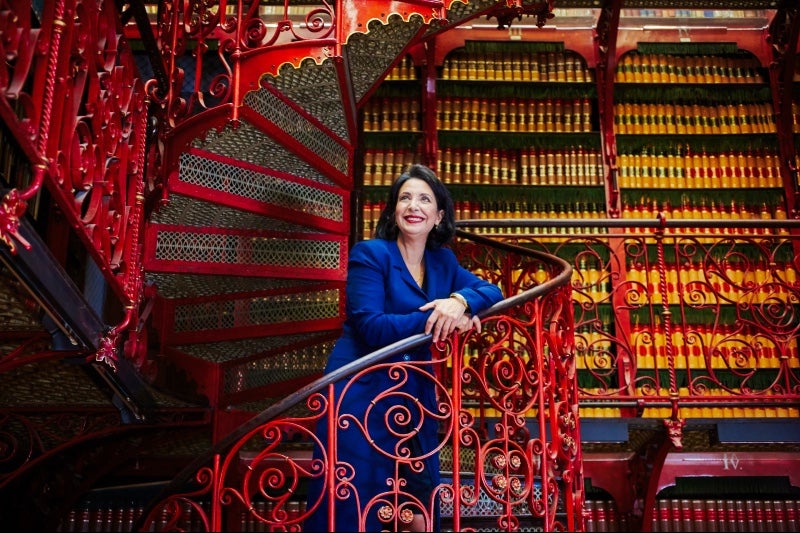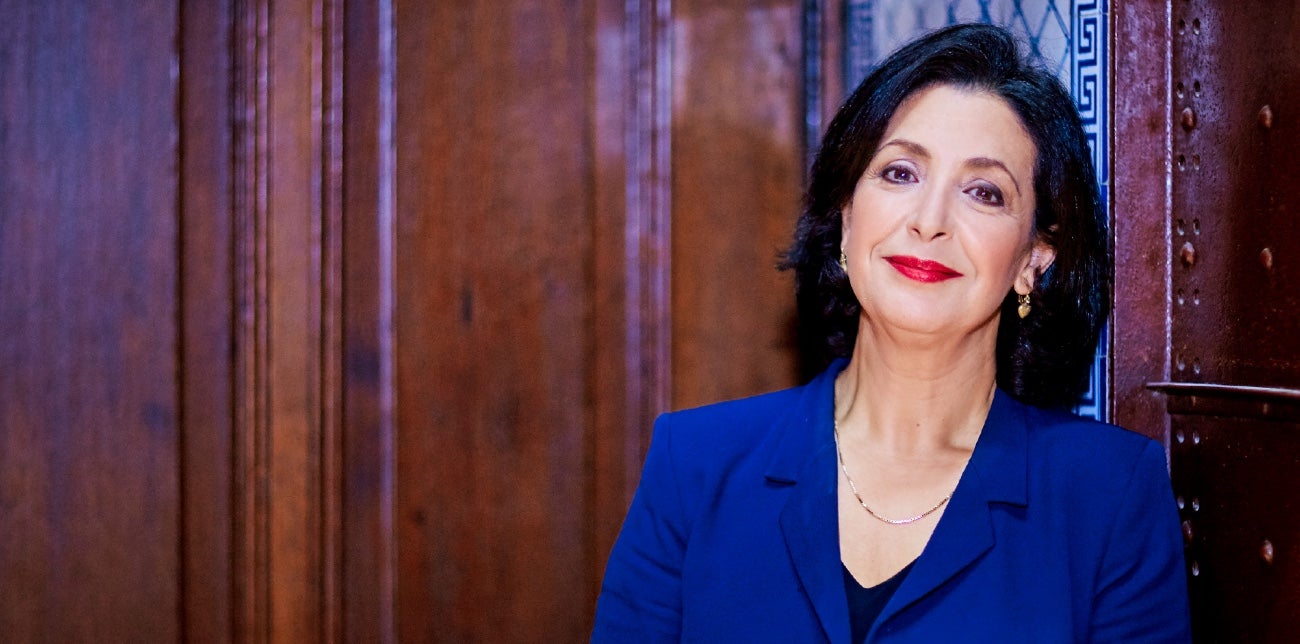A look behind the scenes at the House of Representatives with Khadija Arib (59). November 6th, Speaker of the House Khadija Arib will receive an honorary doctorate from the VU for her efforts concerning diversity.
While starting the interview, Arib apologizes for checking an incoming message on her phone: „I’m sorry. It’s such a challenge trying to plan my day. There’s always something unexpected happening.”
How did you get interested in politics?
„I grew up in Morocco and as a result, I realized what it meant to live in a dictatorship from a young age on. There were no free elections, no freedom of speech and protests were forbidden. In primary school, socially conscious teachers instilled in me that I needed to pursue my studies in order to achieve something in a world that was so unequal. I wanted to do something about that inequality."
„I arrived in The Netherlands when I was fifteen, together with my mother. Back then, I already noticed that it wasn’t easy for women from immigrant backgrounds to establish a position for themselves in society. There was legislation in place that made women with an immigrant background dependent on men or their fathers. Around me, I’d see Moroccan girls that weren’t allowed to go to school. That’s when I established De Marokkaanse Vrouwen Vereniging Nederland, an association that is devoted to improving women’s societal activities. Personal experiences often make you reconsider things. Why don’t all people have the same rights and chances in life?”
Were you already this outspoken as a student?
„It wasn’t necessary for me to be so vocal – everyone was outspokenly critical during the seventies. If I was participating in a protest, I’d run into my teachers from the school I attended at the time, the Sociale Academie [Social Academy]. There was a wave of emancipation happening and essentially everyone was talking about gender inequality. I was attending that school while barely speaking any Dutch, but luckily I was a very experienced volunteer. For years, I had been visiting families that barely had any food or people whose gas and power had been cut off. Those things would happen in The Netherlands."
„I was waiting at Amsterdam Lelylaan when I realized that I would be picked up by a service car that day."
„I wanted to somehow make sense of the things that I would see out there. That’s why I started studying sociology at the University of Amsterdam. Again, I was being confronted with how conservative The Netherlands really were. There were long waiting lists for day-care facilities and children were sent home for lunch. Everything revolved around the male breadwinner and women weren’t given the same chances in life. People would often be surprised and ask me: ‘How are you working fulltime and caring for three small children at the same time?’ I’d always think to myself: I probably shouldn’t tell them that I’m also attending university.”
Did you feel nervous for your first day as Speaker of the House?
„It wasn’t too bad. I had already gained quite a bit of experience as vice-chairman. Although nobody seemed to remember that once I wanted to pursue the candidacy for the position as Speaker of the House, which garnered quite a bit of negative attention. I remember very vividly the day that I was appointed. I was waiting at Amsterdam Lelylaan when I realized that I would be picked up by a service car that day. I quickly took a tram back home.”
„On the same day, I could be dealing with a broken chair or a Member of Parliament whose card isn’t working properly."
What does an average day in your life look like?
„When you’re working in the House of Representatives, no day is the same. Anything can happen at any given time that could potentially mess your entire day up. One time I’m dealing with constitutional issues, such as the role of parliament when it comes to information provision to the House. On that same day, I could be dealing with a broken chair or a Member of Parliament whose card isn’t working properly. It’s a very diverse job, something I deal with pretty well."
„A lot has changed since the COVID pandemic. Out of nowhere, I turned into a crisis manager. I was working from an empty building five days a week, because it was my job to make sure that our democracy wouldn’t be kept from running, without putting people in danger. We managed to solve that problem in creative ways, mostly digitally – which gave me the opportunity to watch Members of Parliament working from their homes, unshaven and in their pyjamas."
„But it was also an intense and heavy time period that took a toll on me and Members of Parliament. We were dealing with our own lives next to work, with family members getting infected. I wasn’t able to see my children, my grandchildren and my mother. That was hard. At the same time, we – as the House of Representatives – needed to give people the confidence that we were continuing to do our jobs. I don’t know how I did it, but we somehow managed to make it work.”
You’re a member of the PvdA [Labour Party], but you need to remain impartial during debates. Do you always manage to not let your emotions get in the way, subconsciously?
„From time to time there will be debates taking place during which I’m thinking to myself: well well, it’s been quite enough. Debates can sometimes take too long when people are zooming in on details too much. In some cases, opposing viewpoints cannot be settled by a debate. That’s when I tend to cut people off. But I don’t feel as if I’ve ever done that because I disagreed with someone. If that were the case, I’d be cutting people off left and right.” Arib laughs and then continues: „All Members of Parliament are equal and I treat everyone the same. If I really cut someone off or if I’m moody, it also has something to do with how I’m feeling at that point in time. I’m only human. That doesn’t have anything to do with my political affiliation."

Copyright Iris Planting/DutchandFamous
„And sometimes debates can be very enjoyable. Last week there was a debate happening between Rutte and Van Raak (from the Socialist Party) about having or not having an ideology. It was a beautiful debate that really went into depth. I can thoroughly enjoy the beauty of a debate being brought out fully.”
Members of Parliament that refuse to sit next to each other or are asked to go to the corridor after misbehaving: do you feel like a teacher having to calm down her classroom full of children sometimes?
„They are grownups of course, but sometimes strange things happen. Luckily, I’ve never had to remove someone from the room. The only tool that I make use of sometimes is turning off the microphone. Some people think I’m limiting their freedom of speech when that happens, but that doesn’t have anything to do with it.”
When you’re noticing that a debate is being used for personal gain instead of coming to a consensus, where exactly do you draw the line?
„I’ll speak up whenever I get the feeling that people are only present to make a promotional video, or to interrupt others in order to present themselves in a certain way. It’s inappropriate and unheard of to misuse a debate for your own videos. Cutting and pasting into a debate can present an entirely different story and misleads and misinforms the voter. This tactic has somehow found its way into our parliament and is damaging to both its members and topics being discussed.”
Geert Wilders considered the day you were elected Speaker of the House a “black day”. How did you deal with his criticism at the time?
„There were other Members of Parliament opposing my election who voiced their opinions in the paper, anonymously. Wilders was openly against my chairmanship. That bothered me, of course. But at the same time I mostly just figured: you can say whatever you want, but at the end of the day I was chosen to do this job by the House. Some people assumed that my Moroccan roots would make it impossible for me to remain impartial."
„People are very tough when power is involved."
„I’ve noticed those sentiments are returning now that the elections are approaching. People are afraid that I might put myself forward as a candidate again. People are very tough when power is involved. On the one hand people seem to value our multicultural society and someone with my background filling this position, but when push comes to shove they think to themselves: why her and not me? The fact that I’m both a woman and a migrant aren’t exactly helping.”
You’re receiving this honorary doctorate because of your efforts concerning diversity. Which changes concerning emancipation of minorities would you like to see happening in politics?
„Women are not as well represented in the House these days. We’re asking society to do all kinds of things, but when it comes to the House itself, women are underrepresented. I’m in favor of a quota, but those kinds of things don’t just happen overnight. I’m hoping that after the next elections, at least half of the House will be filled with women."
„I’d be in favour of having a dock worker and farmer on the list."
„Additionally, it’s important for people to recognize themselves in their representatives. That includes Members of Parliament that come from non-western backgrounds. The people on that list should be a representation of our society as a whole. Not just when it comes to background, but also when it comes to educational level and age. I’d be in favour of having a dock worker and farmer on the list. Diversity is very important. The process of political decision-making will only grow stronger if we’re not all the same, if we don’t all look the same.”
On Friday, 6 November Khadija Arib will receive an honorary doctorate during the Dies Natalis. This year’s Dies Natalis Lecture will be given by Her Majesty Queen Máxima. For more information and a link to the streaming, click here.






